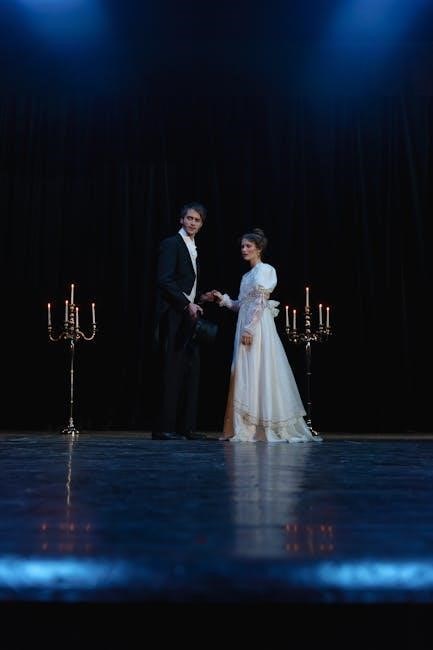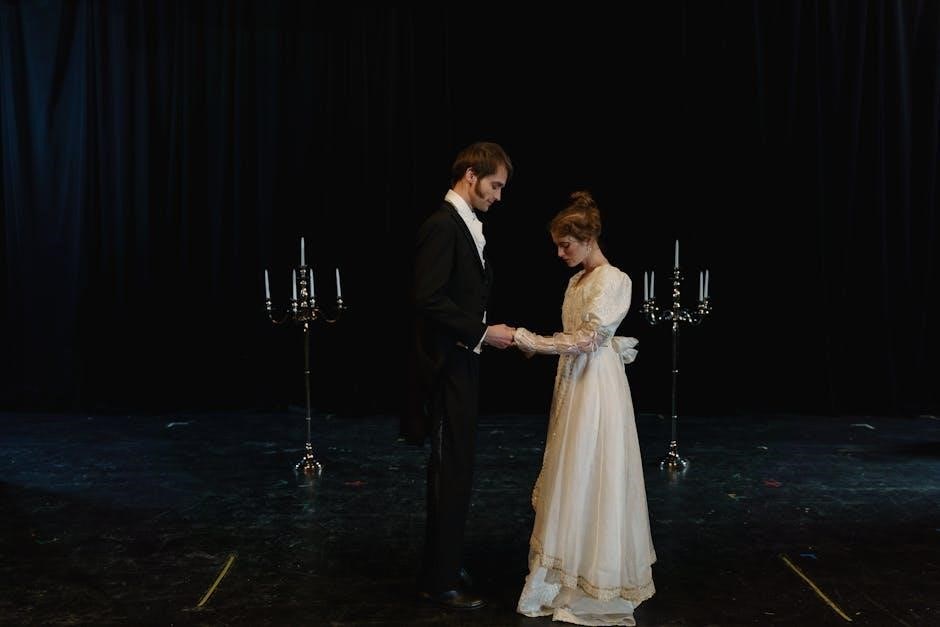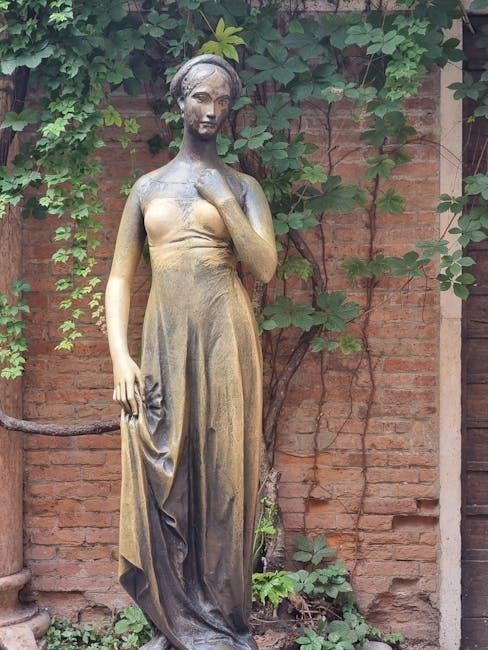Romeo and Juliet, a tragic love story by William Shakespeare, explores themes of love, fate, and conflict in Verona. Act 1 sets the stage for the feud between the Montagues and Capulets, introducing key characters and their motivations, while laying the foundation for the eventual tragic events that unfold.
Background of the Play
Romeo and Juliet, a timeless tragedy by William Shakespeare, is set in Verona, Italy, against a backdrop of a bitter feud between the Montagues and Capulets. The play, rooted in an Italian tale, explores themes of love, fate, and conflict. Act 1 introduces the families’ animosity, Paris’s proposal for Juliet’s hand, and Juliet’s close bond with her Nurse. The Capulet’s ball sets the stage for Romeo and Juliet’s first meeting, igniting a chain of events that drives the tragic narrative forward.
Setting of Verona
Verona, a picturesque city in Italy, serves as the backdrop for Romeo and Juliet, amplifying the play’s emotional depth. The city’s ancient streets and public squares host the bitter feud between the Montagues and Capulets. Prince Escalus, Verona’s ruler, attempts to maintain order amidst the chaos. Act 1 introduces Verona’s vibrant social life, highlighted by the Capulet’s grand ball, where Romeo and Juliet first meet. The city’s setting underscores the clash of love and hatred that defines the tragic narrative.

Act 1 Scene 1: The Feud Between Montagues and Capulets
The play opens with a brawl between the Montagues and Capulets in Verona’s streets, highlighting their deep-seated hatred and setting the stage for tragic events.
The Fight Scene
The fight scene in Act 1 Scene 1 showcases the intense rivalry between the Montagues and Capulets. Servants from both families clash, leading to a chaotic brawl in Verona’s streets. The tension escalates as more family members join, reflecting the deep-rooted hatred. Shakespeare uses vivid imagery and aggressive dialogue to emphasize the volatility of their conflict, setting the tone for the tragic events that will unfold. Prince Escalus eventually intervenes to restore order, highlighting the need for authority to control their escalating feud.
Prince Escalus’s Intervention
Prince Escalus, the ruler of Verona, arrives to halt the brawl between the Montagues and Capulets. He condemns their ongoing feud and warns of severe consequences if it continues. Escalus’s authoritative presence restores order, but the underlying tension remains. This intervention highlights the prince’s role as a mediator and his frustration with the families’ endless rivalry, setting the stage for further conflict and tragic events in the play.

Act 1 Scene 2: Lord Capulet and Paris
Lord Capulet discusses Juliet’s potential marriage to Paris, expressing hesitancy due to her youth. He invites Paris to a ball to assess Juliet’s readiness for marriage.
Paris’s Proposal for Juliet’s Hand
Paris, a young nobleman, approaches Lord Capulet to request Juliet’s hand in marriage, highlighting his wealth and status as suitable reasons for the union. He argues his eligibility, emphasizing his ability to provide a stable and honorable life for Juliet. Despite his persuasive arguments, Paris’s proposal is met with Capulet’s cautious response, as he believes Juliet is still too young for marriage. This exchange sets the stage for Juliet’s eventual defiance.
Lord Capulet’s Response
Lord Capulet responds to Paris’s proposal with a mix of consideration and hesitation, acknowledging Paris’s noble qualities but expressing concern over Juliet’s youth. He believes Juliet is too immature for marriage and suggests waiting a few years. Capulet invites Paris to attend a ball he is hosting, offering an opportunity for Paris to meet Juliet and win her favor. This response reflects Capulet’s protective stance while also keeping the door open for potential future arrangements.
Act 1 Scene 3: The Capulet Household
In the Capulet household, Lady Capulet discusses Juliet’s potential marriage to Paris with the Nurse, highlighting Juliet’s youth and her own hopes for her daughter’s future;
Juliet and Her Nurse
Juliet and her Nurse share a deeply personal and affectionate relationship, with the Nurse having raised Juliet since childhood. The Nurse’s loyalty and closeness to Juliet are evident as she reminisces about Juliet’s upbringing, showcasing her maternal bond. Their interactions reveal Juliet’s innocence and the Nurse’s protective nature, highlighting the emotional dynamic within the Capulet household. The Nurse’s character, both cheerful and talkative, adds warmth to the scene, contrasting with the formalities of the family’s social obligations.
Preparation for the Ball
The Nurse and Lady Capulet prepare Juliet for the Capulets’ grand ball, discussing potential suitors like Paris. The Nurse fondly recalls Juliet’s childhood, emphasizing her growth into a young woman. Juliet’s reluctance to marry is evident, yet she obeys her mother, showcasing her loyalty and innocence. The scene highlights the societal pressures on Juliet, as her family aims to secure a advantageous marriage. The Nurse’s loyalty and affection for Juliet add emotional depth to the preparations, foreshadowing the conflicts ahead.

Act 1 Scene 4: The Capulet’s Ball
The Capulets host a grand ball, where Juliet is showcased to potential suitors like Paris. Romeo, uninvited, attends with his friends, seeking Rosaline but finding Juliet instead, sparking immediate attraction and romantic tension. The Nurse identifies Romeo, adding drama to the scene.
Romeo and His Friends Crash the Party
Romeo, accompanied by Mercutio and Benvolio, attends the Capulets’ ball uninvited, wearing masks to conceal their identities. The lively atmosphere of music and dance fills the hall as they mingle. Romeo’s friends encourage him to forget Rosaline, but his eyes soon lock onto Juliet. The Nurse, noticing Romeo’s fascination, identifies him to Tybalt, who vows to confront the intruder. The scene highlights the tension between romance and rivalry, setting the stage for tragic events. Masks momentarily hide the truth but cannot prevent destiny’s course.
The First Meeting of Romeo and Juliet
Romeo and Juliet meet at the Capulets’ ball, where their eyes lock in a moment of deep connection. Their initial encounter is charged with emotion as they exchange gentle words, their attraction undeniable. Romeo, captivated by Juliet’s beauty, takes her hand, and they share a passionate kiss. The Nurse interrupts, revealing Juliet’s identity, leaving Romeo heartbroken yet determined to pursue her. Their meeting sets the stage for their whirlwind romance, overshadowed by the families’ bitter feud.

Act 1 Scene 5: Romeo and Juliet’s Encounter
Romeo boldly attends the Capulets’ ball, where he and Juliet share a magical dance; Their connection ignites a deep, forbidden love amidst the animosity between their families.
Their Famous Balcony Scene
Romeo sneaks into the Capulets’ garden, where he declares his love to Juliet on her balcony. Juliet, smitten, vows her devotion, and they exchange promises of eternal love. This iconic scene underscores the intense passion and impulsiveness of their relationship, while highlighting the societal barriers that threaten their union. Romeo’s bold declarations and Juliet’s tender responses encapsulate the tragic beauty of their love story, setting the stage for the inevitable heartbreak that follows.
Exchange of Vows
Romeo and Juliet’s exchange of vows in Act 1 underscores their deep emotional connection and impulsive decisions. Juliet, though young, demonstrates maturity in her devotion, while Romeo’s passion drives their secret commitment. Their vows highlight the intensity of their love, overshadowed by the impending conflict between their families. This moment sets the stage for their tragic fate, as they pledge loyalty despite the obstacles ahead.
Character Analysis
Romeo and Juliet are central to the play, showcasing youthful passion, impulsiveness, and loyalty amidst Verona’s feud. Their characters drive the tragic narrative forward, highlighting love’s power and fate’s cruelty.
Romeo’s Character
Romeo, a young Montague, is portrayed as handsome, intelligent, and deeply emotional. His impulsive nature and romantic idealism drive his actions, as seen in his infatuation with Rosaline and later Juliet. Despite his loyalty to his family, Romeo’s passion often overshadows reason, leading to reckless decisions. His sensitivity and poetic language reveal his artistic side, while his loyalty to friends and family underscores his noble character. His emotional depth and vulnerability make him a relatable and tragic figure.
Juliet’s Character
Juliet, the young Capulet daughter, is portrayed as naive, loyal, and innocent in Act 1. Her sheltered upbringing and deep bond with her nurse reflect her purity and trust in others. Despite her youth, Juliet shows curiosity about her future, revealing a growing awareness of her role in society. Her loyalty to her family is evident, yet her interactions with Romeo spark a desire for autonomy. Her emotional depth and vulnerability make her a sympathetic character, showcasing her transition from childhood to adulthood.
Tybalt’s Character
Tybalt, Juliet’s cousin, is portrayed as hot-headed and impulsive in Act 1. His deep-seated hatred for the Montagues drives his aggressive behavior, making him a volatile figure. A skilled swordsman, Tybalt is fiercely loyal to his family and eager to defend their honor. His animosity toward Romeo, evident at the Capulet ball, showcases his fiery temperament and forebodes future conflict. His actions are driven by pride and a desire to uphold his family’s reputation, highlighting his complex and antagonistic role.
Lord Capulet’s Character
Lord Capulet is a figure of authority and tradition, deeply committed to his family’s honor and reputation. In Act 1, he appears as a pragmatic and controlling father, arranging Juliet’s marriage to Paris. Despite his strict demeanor, he shows concern for Juliet’s youth, suggesting he values her well-being. His willingness to host the ball for Paris highlights his strategic thinking and desire to secure advantageous alliances, showcasing his complex role as both a father and a societal figure in Verona’s elite.
Key Events and Themes
The feud between Montagues and Capulets ignites, showcasing hate and societal pressures. Romeo and Juliet’s encounter introduces love’s redemptive power, foreshadowing fate’s tragic role.
The Fight Between Tybalt and Romeo
Tybalt, Juliet’s cousin, recognizes Romeo at the Capulet ball and vows revenge for the intrusion. His anger escalates the feud, creating tension and foreshadowing future conflict. The clash between Tybalt’s aggression and Romeo’s passive nature highlights the destructive power of hate, central to the play’s tragic trajectory. This rivalry sets the stage for later confrontations, underscoring the inevitability of violence in Verona’s divided society.
The Theme of Love vs. Hate
Act 1 of Romeo and Juliet introduces the pervasive theme of love vs. hate, central to the play’s tragic narrative. The feud between Montagues and Capulets embodies deep-seated hatred, while Romeo and Juliet’s budding love represents hope and passion. Their families’ animosity contrasts sharply with the young lovers’ devotion, highlighting the destructive power of hatred and the redemptive potential of love. This duality drives the plot and underscores the inevitability of tragedy in Verona’s divided society.